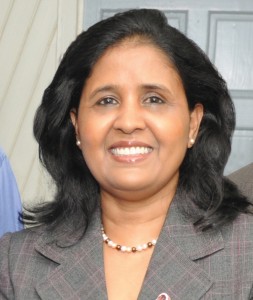
National AIDS Programme Secretariat (NAPS) Programme Manager, Dr Shanti Singh said Guyana has come a far way since the first AIDS case was recorded in 1987. She made the remark as Guyana joined the HIV global community in observing World AIDS Day 2013 held under the theme “Getting to Zeros – Zero New Infections, Zero AIDS related deaths and Zero Discrimination”.
Dr Singh in a release said NAPS has been privileged to be at the centre of the response.
“We have committed from the very first case that our people will be provided with the highest quality of services and we have dedicated much of our time to fulfilling this promise.
“Indeed, the progress speaks for itself – Guyana has reported universal access to HIV prevention and treatment services, we are well poised to declare the elimination of mother to child transmission, many Guyanese know their HIV status, more than 81 per cent of persons living with HIV are reporting a 12-month survival, and AIDS related deaths have decreased from almost 10 per cent in 2002 to less than four per cent in 2010. These translated to everyday lives mean that fewer babies are being born with HIV, less HIV infections are occurring and people living with HIV are living longer and healthier lives. We are turning the tide against the epidemic!”
Dr Singh said as Guyana reflects on its achievements, NAPS has acknowledged that the journey is far from over; pointing out that stigma and discrimination remained an issue.
After 26 years, people and especially persons from the key populations are hesitant to access HIV prevention and treatment services for fear of discrimination. This has the potential to increase new infections and AIDS related deaths.
Response

Michel Sidibé
The Guyana HIV response has continually evolved over the last 26 years, moving from an emergency response targeting the general population to now one that requires a more targeted focus on the high risk groups, from an initial vertical programme response to one now requiring a more sustained integrated approach and from acute management to now considering HIV as a chronic disease.
“Through all of this, our people have been fortunate to have unswerving and loyal partners who have responded with us at the very beginning and many of whom are still with us. We are grateful for the support of the government and people of the United States of America, for the PEPFAR, USAID and other programmes, the Global Fund, the World Bank, PANCAP, CIDA and all other institutions and agencies. We are thankful to all of the technical agencies under the UN system – UNAIDS, PAHO, UNICEF, UNFPA and all others.
She added: “We salute our healthcare workers who have despite all the odds have persevered and continue to save lives.”
She said though Guyana has come a far way, it must not be complacent, but must build on the momentum gained in reversing the epidemic.
“We appreciate that only the combined efforts of our partners, stakeholders, people living with and affected by HIV and every Guyanese will bring us to the end of AIDS.”
Meanwhile, UNAIDS Executive Director Michel Sidibé said families and friends who gather together to remember lost loved ones can rejoice in incredible hope for the future.
“For the first time, we can see an end to an epidemic that has wrought such staggering devastation around the world. For the first time, we can say that we are beginning to control the epidemic and not that the epidemic is controlling us.
“Few thought that we could achieve the progress which we are seeing today. Progress is clear in the scientific breakthroughs, visionary leadership and precision programming. The combination of these powerful factors means that people living with HIV can live long and healthy lives, can now protect their partners from becoming infected with the virus, and can keep their children free from HIV,” he said.



